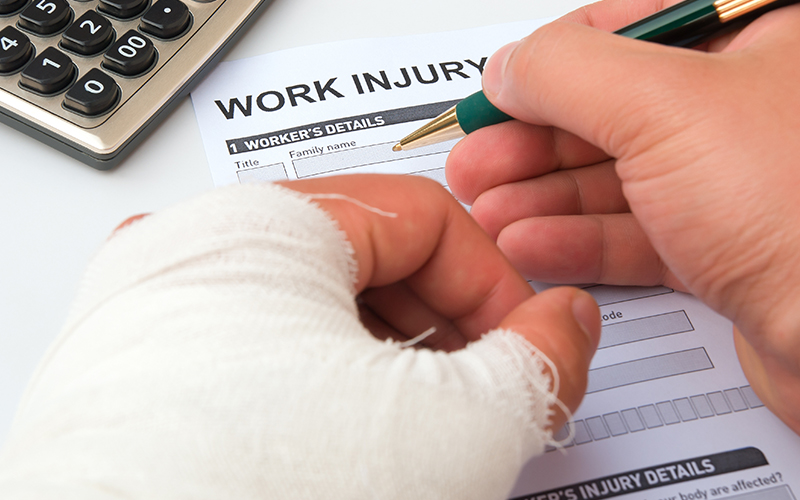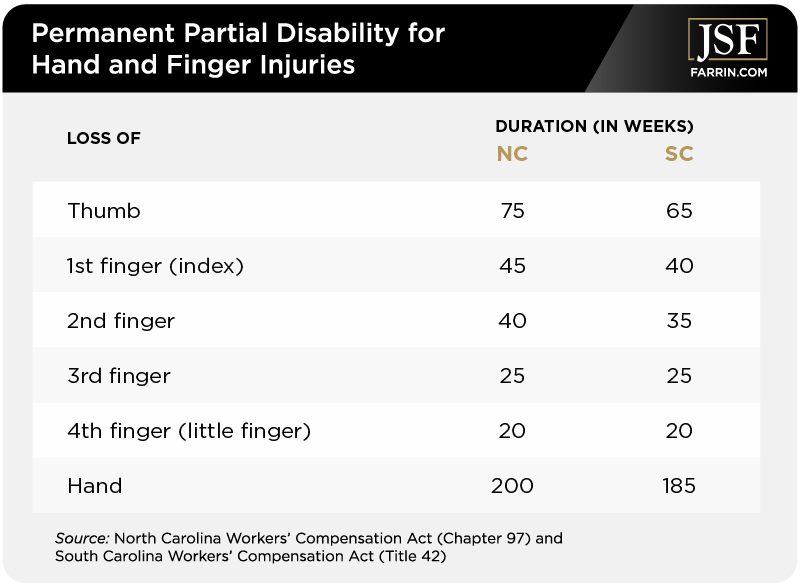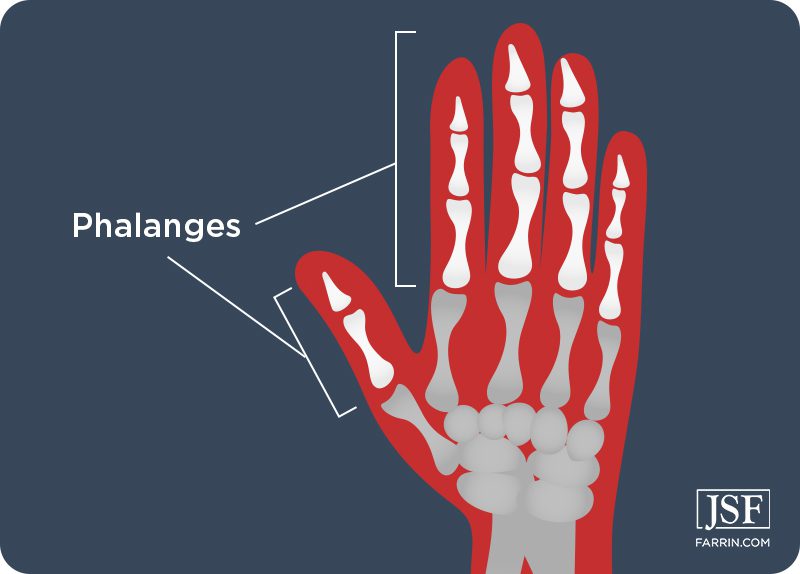People who injure their hands at work are placed in a vulnerable position. You rely on your hands for countless daily activities. On the job, employees need their hands to perform their tasks and provide value – and when they hurt their hands, they are often unable to work.
That’s when things can get even more difficult. On top of your regular bills, there may be new medical expenses to pay for doctor visits, therapies, and medications. Fortunately, this is where workers’ compensation can come into play to help you.
Every day, I work with clients who have been injured in work accidents. I often hear questions such as “What are typical hand injury compensation amounts?” and “What is a good workers’ comp finger injury settlement?” I assume many of you out there have the same kinds of questions, and I’ll answer a few of the most common ones below.
What Are Typical Hand Injury Compensation Amounts?
The answer to this question depends on what state you work in. All states have provisions for:
- medical care
- wage replacement, and
- permanent impairment benefits
Each state also has specific laws that cover which of these workers’ compensation benefits an injured worker may be entitled to. Typical medical care expenses may include doctor visits, medications, and more.
Wage replacement benefits are the weekly workers’ compensation checks that an injured worker receives while out of work due to a workplace injury. These benefits are paid at the injured worker’s compensation rate which is two thirds of their pre-tax earnings, and they are not taxable.
An injured worker may also be entitled to payment for permanent disability benefits at the close of medical treatment. These benefits are calculated by multiplying the state law-prescribed number of weeks for the body part (below) x the percentage impairment rating given by the doctor x the compensation rate (which is 66 and 2/3% of the average weekly wage in both states). The following chart details the number of weeks assigned to each part of the hand:
This chart assumes the total loss or amputation of the finger or hand. Each state has its own laws regarding how to determine the impairment percentage if there has not been a total loss. In North Carolina, the doctors have access to the North Carolina Ratings Guide, which helps determine the percentage impairment. In South Carolina, the percentage impairment is based on the AMA Guidelines.
In North Carolina, if the injury only affects the first phalange of the thumb or finger (there are three phalanges in fingers and two in thumbs), the loss is considered to be half of the entire finger or thumb, and the period of time benefits may be paid is half of the amount stated in the chart above. If the injury affects more than one phalange of the thumb or finger, the loss is considered to be the same as a total finger or thumb, and the period of time benefits may be paid is the same as the amount stated above, but cannot exceed the duration of weeks for loss of a total hand.
Your medical provider will review your claim against the applicable guidelines and assign a percentage impairment. However, it is important to note that the provider’s opinion on the percentage impairment is just one opinion. Sometimes, medical providers may incorrectly apply the guidelines and assign a rating that is lower than the amount that you may be entitled to under the law.
For example, we worked with a client who was assigned a 75% rating, despite the fact that the amputation went to the second phalange. Fortunately, we were able to increase the value of that rating significantly because of our familiarity with the law.1
An experienced workers’ compensation attorney can review the assigned rating and determine whether it is too low. If it is, the next step would be to address the issue with your medical provider or seek another medical opinion.
Average Workers’ Compensation Benefits for Hand Injuries
The National Safety Council tracks average workers’ compensation claims costs by body part, including medical care and wage replacement. The National Safety Council reported that the average claim cost for hand/fingers/wrist injuries in 2019-2020 was $14,669 in medical costs and $11,235 in wage loss benefits.1
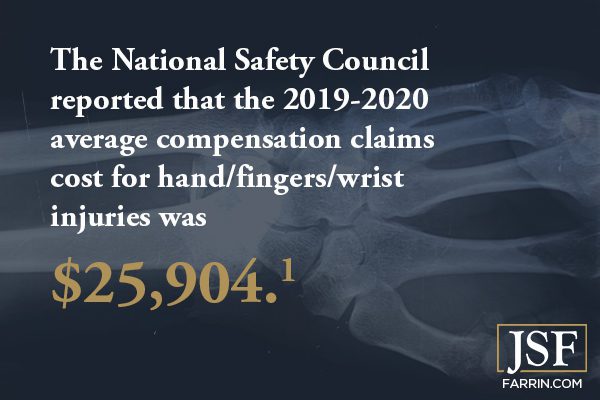
Average Workers’ Compensation Settlements for Hand Injuries
After your doctor decides that you have benefitted as much as you can from medical treatment (known as reaching maximum medical improvement (MMI)) and that the range of movement in your hand or finger is permanently restricted, you may be entitled to permanent partial disability or permanent total disability benefits. These are the benefits that can be the basis for final settlement and payout negotiations.
Workers’ comp hand injury settlements are not tracked by a reliable independent source, so I can’t provide you with an average hand injury settlement amount. But that’s okay because unlike benefits, settlement amounts vary widely. Actual settlement amounts are based on the specifics of the cases, and the structure and content of each settlement can be negotiated to include the client’s particular medical needs. An attorney can be instrumental in helping you negotiate for compensation for the harms you suffered.
Learn More: How Do Settlements Work in Workers’ Compensation Cases?
What Factors Affect a Workers’ Compensation Case for a Hand Injury?
Many different factors come into play when determining workers’ compensation benefits and settlements for workers who have sustained on-the-job hand and finger injuries. First and foremost, you must qualify for workers’ comp, which means:
- You must be an employee.
- Your employer must be required to carry workers’ compensation insurance.
- Your hand or finger must have been hurt as a result of work.
- You must report your hand/finger injury according to your state deadline.
You can file a claim for workers’ compensation benefits for medical expenses and lost wages in North Carolina or South Carolina. The type and amount of possible lost wages will be affected by the seriousness of the injury in terms of permanence (temporary or permanent) and scope (partial or total), as well as your average weekly wage and your state’s workers’ comp laws.
How Is Nerve Damage Addressed in Workers’ Compensation Hand and Finger Settlements?
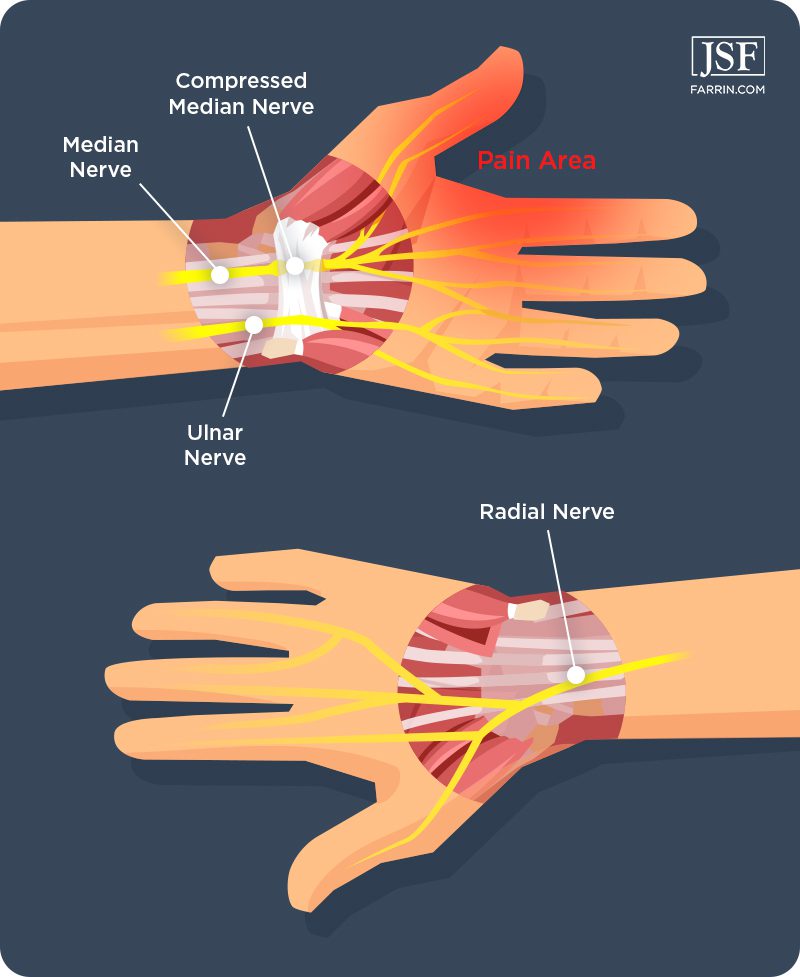
For example, a serious injury to the median nerve can make it difficult to make a fist, write, or use a keyboard. Ulnar nerve damage can lead to complete or partial loss of sensation in the hand or fingers, and radial nerve damage can affect one’s ability to pinch or grasp items.
Nerves in the hands and fingers can be damaged by traumatic injury or by an occupational disease (such as carpal tunnel syndrome or cancer) caused by repetitive stress or toxic exposure in the workplace. Some cases of nerve damage can be treated with physical therapy, hand and wrist braces, and medication, while others require surgery.
The extent of the nerve damage to your hands and fingers will be evaluated by a doctor to determine your type, or level, of disability and the corresponding workers’ comp benefit to which you may be entitled. Here are more details on the types of disability and how to calculate possible compensation in South Carolina and North Carolina.
Nerve damage can be difficult to prove when the primary symptom is pain, which is subjective. There are many ways an attorney can help you try to prove nerve damage, such as:
- compiling your medical records, such as x-rays or scans which could reveal a pinched nerve
- obtaining professional opinions and diagnoses
- inquiring if a nerve study, such as a nerve conduction velocity (NCV) test, is needed
With this information, a workers’ comp lawyer can try to ensure the inclusion of nerve damage in hand workers’ compensation settlement negotiations on your behalf.
Why You Should Hire a Lawyer for Your Hand/Finger Injury Workers’ Comp Case
An experienced workers’ compensation attorney can help you understand what benefits you may be entitled to and what the laws, processes, timelines, and requirements are in your state.
A workers’ compensation lawyer can help you assess the impact of your hand/finger injury on your life right now, as well as on your future. Will you need surgery or in-home care? Will you be able to return to your job fully, or will your be on restricted duty for a while? What if your workers’ compensation application is denied or you don’t like the physician your employer has sent you to? These are just a few of the questions that can come up during you workers’ comp case that your attorney can guide you through.
And don’t worry about whether or not you can afford an attorney. At my firm, if we decide together to proceed with your case after your free case evaluation, we will work with you on a contingency fee basis.2 This means that there will be no upfront or hourly costs to you, and we only get an attorney’s fee if we recover compensation for you. Call now at 1-866-900-7078 or fill out our online form.
You May Also Be Interested In
What Is a Permanent Impairment Rating? (Charts Included)
What Is the Average Workers’ Comp Shoulder Injury Settlement?


